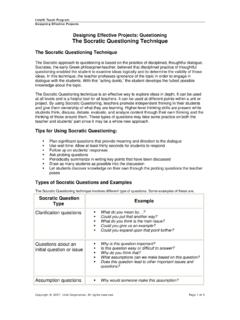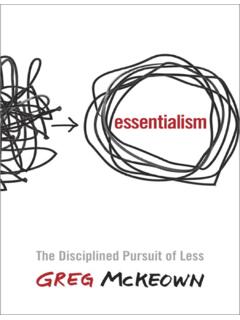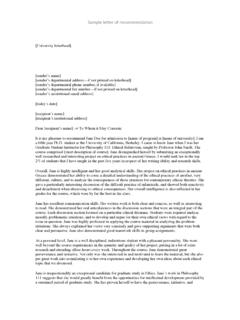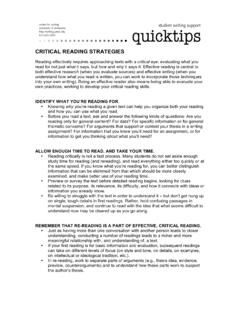Transcription of The Disciplined Trader Developing Winning Attitudes by ...
1 TheDisciplined TraderDeveloping Winning AttitudesMark DouglasNEW YORK INSTITUTE OF FINANCEL ibrary of Congress Cataloging-in-Publication DataDouglas, Disciplined Trader : Developing Winning Attitudes / by 0-13-215757-81. Stockbrokers Attitudes . 2. Stock-exchange. I. dc20 90-30237 CIPThis publication is designed to provide accurate and authoritative informationin regard to the subject matter covered. It is sold with the understanding thatthe publisher is not engaged in rendering legal, accounting, or otherprofessional service. If legal advice or other expert assistance is required, theservices of a competent professional person should be a Declaration of Principles Jointly Adopted bya Committee of the American Bar Association and aCommittee of Publishers and Associations 1990 by Mark DouglasAll rights reserved.
2 No part of this book maybe reproduced in any form or by any means withoutpermission in writing from the in the United States of America10 9 New York Institute of FinanceA division of Simon &. Schuster, BroadwayNew York, NY 10004-2207To Paula Webb for her love, understanding and beingthere throughout the process of writing this ixPreface xiAcknowledgments xviiPart I Introduction 11 Why I Wrote This Book 32 Why a New Thinking Methodology?
3 15 Part II The Nature of the Trading Environmentfrom a Psychological Perspective 313 The Market Is Always Right 354 There Is Unlimited Potential for Profitand Loss 395 Prices Are in Perpetual Motion with NoDefined Beginning or Ending 416 The Market Is an Unstructured Environment 497 In the Market Environment, ReasonsAre Irrelevant 598 The Three Stages to Becoming a SuccessfulTrader 65 Part III Building a Framework forUnderstanding Ourselves 799 Understanding the Nature of the MentalEnvironment 85fin1011121314 How Memories, Associations.
4 And BeliefsManage Environmental InformationWhy We Need to Learn How to AdaptThe Dynamics of Goal AchievementManaging Mental EnergyTechniques for Effecting ChangePart IV How to Become aDisciplined Trader15 The Psychology of Price Movement16 The Steps to Success17 A Final NoteIndex99121139155167181183201223225 ForewordMy unique position in the financial community has allowed me therare opportunity to talk to and question thousands of traders, bro-kers, and trading advisors since 1979. I am not a broker or a letterwriter. I am the chief executive officer of CompuTrac, a companythat supplies technical analysis to stock and futures traders. I per-ceive my position as being neutral, one that allows people to openup and talk to me freely.
5 I started trading for my own account in1960 and very quickly became aware of the underlying psychologicalblocks to good trading and money management. This realization hasbeen confirmed by all who have counseled with a result, I sincerely feel that success in trading is 80 percentpsychological and 20 percent one's methodology, be it fundamentalor technical. For example, you can have a mediocre knowledge offundamental and technical information, and if you are in psycho-logical control, you can make money. Conversely, you may have agreat system, one that you have tested and has performed well for along period of time, yet if the psychological control is not there,you will be the good Trader knows from experience that over a period of timex Forewordhe may engage in more losing trades than Winning ones.
6 But moneymanagement, and a careful assay of the risks protected by realisticstops, will keep the Trader out of trouble and ensure that on the"big" moves, he will profit. Money management is composed of twoessential elements: psychological management and risk manage-ment. Risk management stems from the psychological factors beingtruly understood by the Trader and "in place" before risk is would especially caution new traders and market participantsthat reading and passively analyzing your motivations are certainly anecessity, but the acid test comes with active trading under slowly. Question every trade. What motivated it? How was thetrade managed? Was it successful? Why? Did you lose? Why? Writedown your assessment and refer to your comments before makingyour next all major CompuTrac seminars I try to have a workshop leaderaddress the attendees on the psychological aspects of trading.
7 Thegrim reaper who kills off "your equity" and disappears with yourprofits is not the mysterious and ubiquitous "they" but a simplemisguided "you." Medea said just before she murdered her children,"I know what evil I'm about to do, but my irrational self is strongerthan my resolution." If this sentiment reflects your mind set whenyou trade, then The Disciplined Trader is definitely the type of bookyou should be a pleasure to read this book. My own education cost me alot "the hard way." I can read myself into the pages that's me,that's me! Mark has carefully fashioned his book into a comprehen-sive logical dialogue. It reads as if you are at his side and he isexplaining it as a friend, which I know you will enjoy. You arefortunate because you are taking the time now, before you havemade a serious mistake, I hope, to learn about yourself and to studyyour craft.
8 The traders who take the time to reflect and practice willsurvive and possibly SLATERP residentCompuTrac Software, Disciplined Trader is a comprehensive guide to understandingthe psychology of self-discipline and personal transformation neededto become a successful stock or futures Trader . This book will serve asa step-by-step guide to adapting successfully to the unusual psycho-logical characteristics of the trading say "adapting" because most people venturing into the tradingenvironment don't recognize it as being vastly different from thecultural environment in which they were brought up. Not recogniz-ing these differences, they would have no way of knowing that manyof the beliefs they acquired to enable them to function effectively insociety will act as psychological barriers in the trading environment,making their success as traders extremely difficult to achieve.
9 Reach-ing the level of success they desire as traders will require them tomake at least some, if not many, changes in the ways they perceivemarket other social environments, the trading arena has many char-acteristics requiring a very high degree of self-control and self-trustfrom the Trader who intends to function successfully within it. How-ever, many of us lack this self-control because as children we learnedXIIP refaceto function in a structured environment where our behavior was con-trolled by someone more powerful than ourselves, whose purpose wasto manipulate our behavior to conform to society's , we were forced by external forces to behave in certain waysthrough a system of rewards and punishments. As a reward, we wouldbe given the freedom to express ourselves in some desired manner.
10 Asa punishment, we would either be prevented from getting what wewanted, causing emotional pain, or we were inflicted with variousforms of corporal punishment, causing physical pain. As a result, theonly form of behavior control that we typically learned for ourselveswas based on the threat of pain either emotional or physical fromsomeone or something we perceived as having more power thanourselves. And since we were forced to relinquish our personal powerto other people, we naturally developed many of our traditional re-sources for success (the particular ways in which we learned to getwhat we want) from the same mental framework. Accordingly, welearned that acquiring power to manipulate and force changes uponthings outside of us was the only way to get what we thing you will learn as a Trader is that the mental resourcesyou use to get what you want in your everyday life will not work inthe trading environment.







